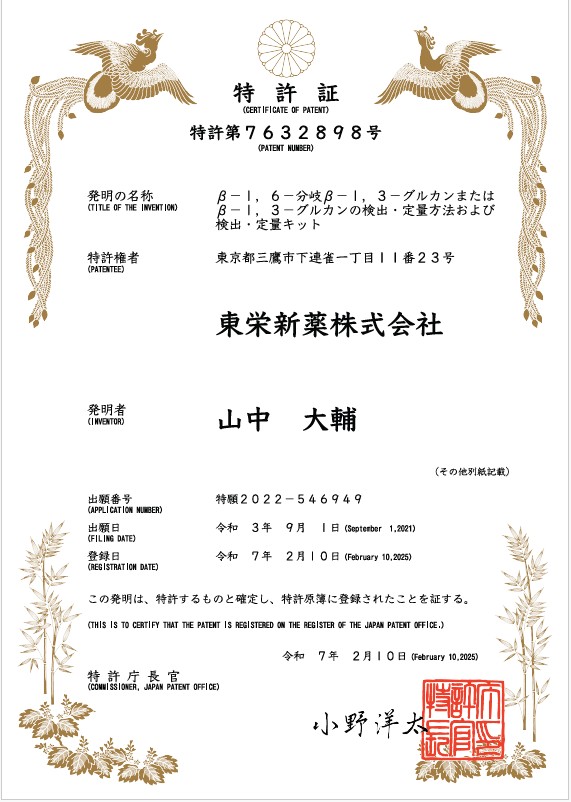【Press Release】 Toei Shinyaku Co., Ltd. Obtains Patent for β-Glucan Quantification Method in Agaricus Mushrooms
Posted on March 18 2025,

【Press Release】 Toei Shinyaku Co., Ltd. Obtains Patent for β-Glucan Quantification Method in Agaricus Mushrooms
Third Domestic Patent Related to β-Glucan Measurement Acquired
—Useful for Diagnosing Fungal Infections and Quantifying β-Glucan in Supplements—
Toei Shinyaku Co., Ltd. (Head Office: Mitaka, Tokyo; President: Akitomo Motoi) is pleased to announce that it has obtained its third domestic Japanese patent related to the measurement method of β-glucan, the main active component in its outdoor-cultivated King Agaricus KA21. This research was conducted in collaboration with the Department of Immunology, School of Pharmacy, Tokyo University of Pharmacy and Life Sciences.

The newly granted patent, titled “Method and Kit for Detection and Quantification of β-1,6-branched β-1,3-glucan or β-1,3-glucan,” represents a significant advancement in accurate β-glucan analysis.
■ Patent Summary
-
Patent Number: JP Patent No. 7632898
-
Date of Registration: February 10, 2025
-
Patent Holder: Toei Shinyaku Co., Ltd.
-
Inventors: Daisuke Yamanaka, Sadayuki Adachi
-
Title of Invention:
Method and Kit for Detection and Quantification of β-1,6-branched β-1,3-glucan or β-1,3-glucan
■ About This Patent
This invention was developed as part of joint research with the Department of Immunology at the Tokyo University of Pharmacy and Life Sciences, based on studies involving Toei Shinyaku’s outdoor-cultivated King Agaricus KA21 in Brazil.
This is Toei Shinyaku’s third patent in the field of β-glucan analysis. The two previously granted patents include:
-
“β-glucan binding protein, β-glucan detection kit, artificial DNA, and bacteria”
(JP Patent No. 6966756, registered on October 26, 2021) -
“β-1,6-glucanase variant and method for measuring β-1,6-glucan”
(JP Patent No. 7052967, registered on April 4, 2022)
All patents are held by Toei Shinyaku Co., Ltd.
■ Expected Applications
This patent and related technologies are expected to contribute to:
-
Development of diagnostic kits for fungal infections
-
Quantification of β-glucan content in health supplements
-
Research on the mechanisms of action of β-glucan
